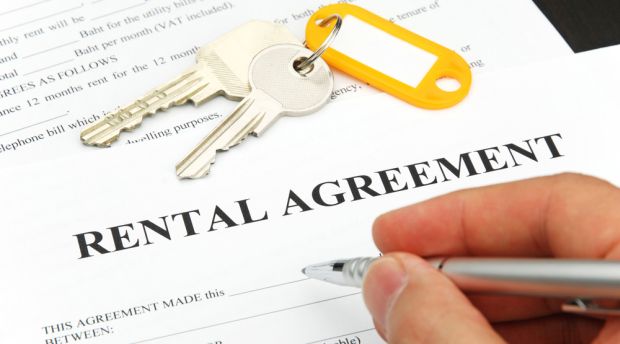Top 8 Tips for Renting an Apartment in a New City
Post Views 12Finding a great first apartment can be stressful, particularly if you’re new to a city.
“You can’t really find one without the other,” says Jackie Drew, who earned a master’s degree in education in May from Rutgers University in New Brunswick, N.J. The 24-year-old recently secured both, but for her, finding a first apartment was much harder than landing a professional job.
In late August Drew landed an administrative-assistant job paying in the low $40,000s annually in Manhattan. But she’d been hunting for a one-bedroom apartment in the New York area since graduation to no avail.
In late September Drew spotted an ad for an apartment in Jersey City, N.J., that she’d seen earlier but couldn’t afford. It was being advertised at a lower price. She quickly e-mailed the landlord saying she was interested and offered two months’ rent in advance. “I wanted her to know I was serious,” she says. They met that afternoon and Drew signed a yearlong lease.
Finding Your Pad
Drew was successful because she persevered and took advantage of a little luck. While the ease of finding a rental varies among markets, real-estate experts and new graduates offer these eight strategies to aid your search:
- Know what you can afford.
Creating a budget can help you start your apartment hunt knowing approximately how much rent you can afford to pay monthly. Max Davis, a former landlord in Salt Lake City, recommends tenants pay no more than 35% of their monthly gross income on rent. “Some people can handle paying more,” he says. “You have to set your own limits.” When calculating your rent payment, be sure you can still afford such necessities as utilities, an Internet connection and food, adds Davis.
- Decide if you need a roommate.
Sharing an apartment with a roommate can dramatically reduce your monthly living expenses. Paul Smith, a May 2014 graduate of Ohio Wesleyan University, moved into a two-bedroom unit with a friend in Columbus, Ohio, in August. They each pay $600 a month in rent and split the monthly utility and cable bills. Smith, an analyst at a real-estate-investment firm, says monthly rents for one-bedroom units in the same complex cost $950.
- Search classified ads first.
If you’re new to an area, scan local newspaper and online classified ads to get a sense of the rental market and what’s available in your price bracket, suggests Davis. If you see ads offering special deals, such as a month’s free rent or waived security deposits, the market is likely in your favor, and you may be able to negotiate at other places as well. “Landlords have mortgage payments to worry about, so when a market is competitive, they tend to offer the best deals,” he says. You may find more special offers toward the end of the month because that’s when apartments usually change hands and landlords become anxious to find tenants, Davis adds.
Apartment hunters who are familiar with an area sometimes can find attractive rentals by searching for vacancy signs in neighborhoods they like. For-rent ads also may be posted at local eateries, grocery stores and other neighborhood bulletin boards.
- Be choosy about location.
Naturally you’ll want a place within commuting distance of your job, but keep in mind that you may change employers at some point. Therefore, seek an apartment located near lots of employers, says Shari Jenson, an owner of a brokerage firm who helps landlords find tenants.
If you own a car, find out where you can park it, Jenson adds. In some neighborhoods, car owners must secure permits to park on the street or pay to park in a garage. These expenses can put a crimp in your monthly budget.
After renting an apartment with two roommates in Washington, D.C., last June, a 2003 graduate of Pennsylvania State University learned she needed to buy District of Columbia license plates to park her car in the residential area. Replacing her Pennsylvania tags set her back about $1,000. She now battles other drivers for parking spots daily and has paid about $750 worth of parking tickets in the past five months for leaving her car on streets scheduled to be cleaned.
- Consider working with a broker.
If you don’t find a rental through the classifieds, consider working with a real-estate broker – a sales professional who matches tenants with landlords. Brokers can quickly steer newcomers to neighborhoods that might be suitable and affordable, says Davis. They’re also likely to have the inside track on unadvertised apartments, he adds. Be prepared to pay at least one month’s rent to the broker for the service.
Some brokerages charge prospective tenants a finder’s fee regardless of whether a lease is signed. Some will sell you a list of apartment rentals for a fee, and you’ll have to do the remaining legwork on your own. In other cases, landlords pay brokers for finding tenants.
Brokers typically advertise their units in local classifieds, so don’t be surprised if a broker answers when you call. However, always ask if he or she charges renters a service fee and if so, how much, says Davis.
- Do a thorough inspection.
Carefully inspect an apartment for damages before signing a lease, says Jenson. Use the sink and bathtub faucets, flush the toilet and turn on the heat and air-conditioning units to make sure they work properly. If problems exist, note them on your copy of the lease and the landlord’s so you won’t be held responsible for paying for repairs later on, she says. If repairs are needed immediately, make a note in writing of how and when they’ll be made and photograph any damages for your records, she adds.
Drew asked a friend to provide an objective eye during her apartment search. “I was so desperate to find a place that I was afraid I’d overlook something obvious,” she says. Her friend pointed out that the apartment she wanted lacked smoke alarms. “I probably wouldn’t have noticed that on my own,” admits Drew. She bought and installed alarms on her own and subtracted the cost from her first month’s rent with her landlord’s consent.
- Get everything in writing.
Before you do any repairs or other changes to an apartment, get permission in writing from the landlord, says Davis. Before signing her lease, Drew asked if she could paint the walls cherry red and rip up the carpets to expose hardwood floors. The landlord agreed, chipped in $50 for the paint and added these details in the lease. “Before you do any repairs or the like, get permission in writing from the landlord,” Davis asserts.
Oral agreements that aren’t confirmed in writing can come back to haunt you. Last July, Katie Frank, a 2013 graduate of Loyola University in Chicago, rented an apartment in the Windy City with a friend. But the pair secured only a verbal promise from the landlord that the unit would be cleaned, a shower rod installed and several broken windows repaired before they moved in. The landlord didn’t follow through. With her roommate, Frank, a software-design analyst at executive-search firm Spencer Stuart, cleaned the apartment, made repairs and subtracted their expenses from their rent. While the landlord never complained, other problems have since arisen and the two are trying to legally break the lease.
- Buy renter’s insurance.
Your landlord’s insurance policy probably covers only damages to the structure of the building and liability for injury on the property. Most [landlords’ policies] don’t include a tenant’s possessions. [Tenants] need a separate policy if you want to be compensated if anything is lost or stolen.
Insurance fees vary throughout the country, but typically average between $250 and $500 a year. Check rates with local insurance agents and those listed on the Web, he suggests.
Also itemize your belongings, preferably by videotaping or photographing each room. But don’t keep the list and pictures in your apartment. If your possessions are lost or stolen, your video or photographs will help you remember and provide proof of what’s missing.
Top 8 Tips for Renting an Apartment in a New City by Granted Contributor



 Take on a New Career after You Burn Out in Your Current Job
Take on a New Career after You Burn Out in Your Current Job  Repayment of Relocation Expenses to Employers
Repayment of Relocation Expenses to Employers  How to Transition from Teacher to Administrator
How to Transition from Teacher to Administrator  Seven Changes to Help You Have More Financial Freedom
Seven Changes to Help You Have More Financial Freedom  Should You Buy a Home? The Cheapest Cities to Buy a Home and Live
Should You Buy a Home? The Cheapest Cities to Buy a Home and Live  Tips for Transitioning into the Nonprofit Sector
Tips for Transitioning into the Nonprofit Sector  Don’t Turn Your Two-Week Notice in Just Yet
Don’t Turn Your Two-Week Notice in Just Yet  Six High-Paying Careers You Can Transition to
Six High-Paying Careers You Can Transition to